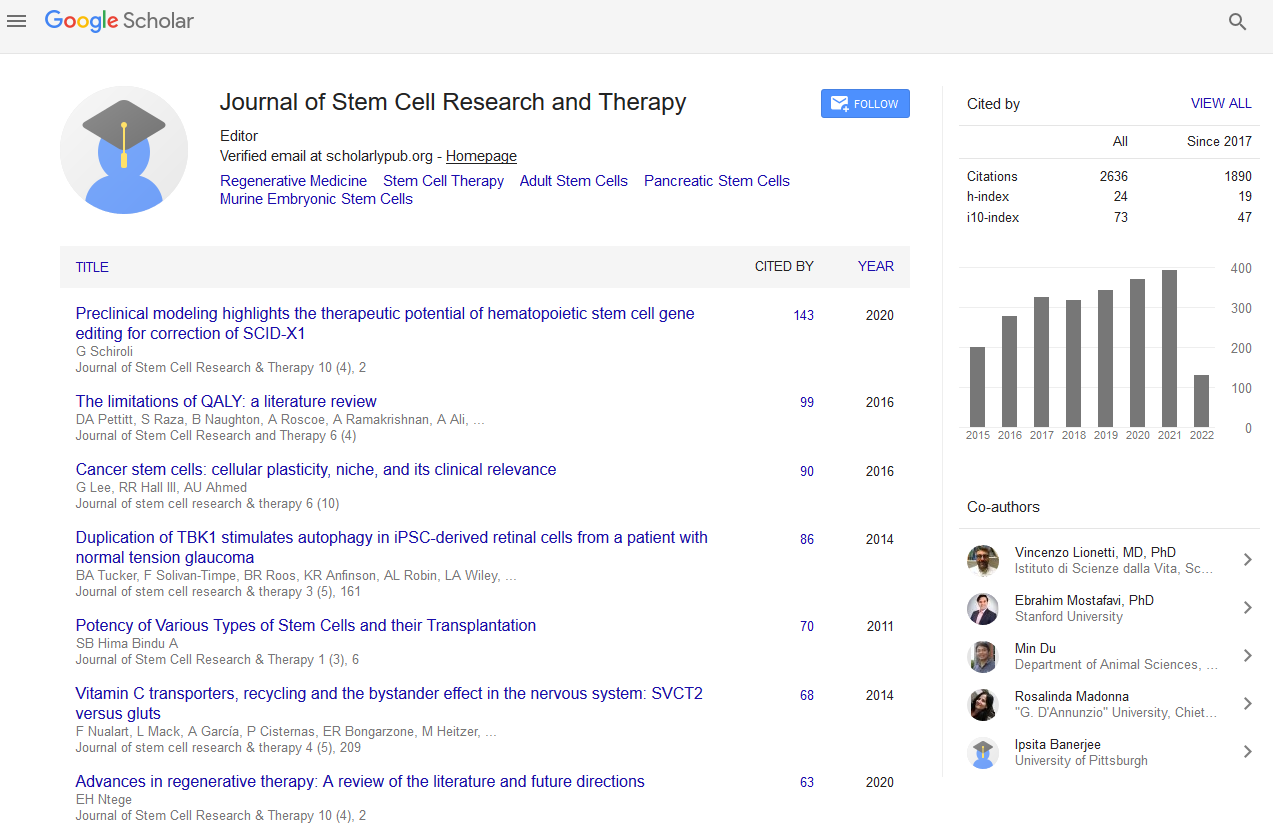Indexed In
- Open J Gate
- Genamics JournalSeek
- Academic Keys
- JournalTOCs
- China National Knowledge Infrastructure (CNKI)
- Ulrich's Periodicals Directory
- RefSeek
- Hamdard University
- EBSCO A-Z
- Directory of Abstract Indexing for Journals
- OCLC- WorldCat
- Publons
- Geneva Foundation for Medical Education and Research
- Euro Pub
- Google Scholar
Useful Links
Share This Page
Journal Flyer

Open Access Journals
- Agri and Aquaculture
- Biochemistry
- Bioinformatics & Systems Biology
- Business & Management
- Chemistry
- Clinical Sciences
- Engineering
- Food & Nutrition
- General Science
- Genetics & Molecular Biology
- Immunology & Microbiology
- Medical Sciences
- Neuroscience & Psychology
- Nursing & Health Care
- Pharmaceutical Sciences
In vivo interspecies stem cell-based tissue engineering: A roadmap towards personalized stem cell medicine
2nd International Conference and Exhibition on Cell & Gene Therapy
October 23-25, 2013 Holiday Inn Orlando International Airport, Orlando, FL, USA
Karim Nayernia and Hans Bojar
Accepted Abstracts: J Stem Cell Res Ther
Abstract:
Tissue Engineering and regenerative is aiming at generating tissues to replace damaged and deteriorated organs. Recently, tissue engineering was applied to generate artificial skin for burn patients, tissue engineered trachea, cartilage for knee-replacement procedures, urinary bladder, urethra substitutes and offered cellular therapies for the treatment of urinary incontinence. The major advantage of tissue engineering approach over traditional organ transplantation is the circumvent the problem of organ shortage. Tissues reconstructed from readily available patients? stem cells induced no immunogenicity when reimplanted in the patient. However, pluripotent stem cells are major limited factors in regenerating new tissues. To overcome these problems, we will present a new technology and used the potential of induced pluripotent stem cells to regenerate new tissues in a host organism. As a model, we used the mouse pluripotent stem cells to assess the potential of these cells to regenerate mouse tissues in rat. Beside the enormous important application of in vivo tissue engineering in human to develop new therapeutic approaches through regenerating new tissues, this model offers an accessible system for study of organ development and a valuable tool for personalized drug screening and a novel approach for personalized stem cell-based tissue regeneration.
Biography :
Karim Nayernia, Ph.D., is Co-Director of Institute of Molecular Medicine and Cell Therapy (mmct.eu) in Dusseldorf and Head of Department ?Stem Cell Medicine? of mmct. In 2003, he got his Professorship from Georg-August University in Molecular Human Genetics. In 2006, he was appointed as Professor of Stem Cell Biology at Newcastle University, Newcastle upon Tyne in UK. In 2010, he got the Honorary Professorship at Durham University in UK. In 2011, Professorships at Erciyes University/Turkey and at Tehran University of Medical Sciences were offered to him. Professor Nayernia received a PhD in molecular genetics from the Medical faculty of the Georg-August University in Goettingen and Bonn/Germany. He got his associate professorship (Habilitation) in molecular human genetics from the Medical Faculty, the University of Goettingen in Germany. In June 2006 he moved from Germany to UK to lead stem cell section at the University of Newcastle and got the title of Professor of Stem Cell Biology. Professor Nayernia?s research focus is molecular mechanisms of human genetic diseases, germline stem cells, cancer stem cells, pluripotent stem cells and tissue regeneration. His lab was the first lab where derived embryonic stem cell like cells from adult germline stem cells and derived the first functional sperm cells from embryonic stem cells. He published his works in more than 75 International Journals including Nature, Dev Cells and Molecular Human Genetics and presented these studies at 230 International and National Conferences. He supervised more than 50 M.Sc and Ph.D. students in the field of Molecular and Cellular Medicine. His pioneering scientific works were recognized by several International Awards.


